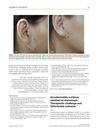 9 citations,
December 2010 in “Journal of The European Academy of Dermatology and Venereology”
9 citations,
December 2010 in “Journal of The European Academy of Dermatology and Venereology” Latanoprost therapy potentially caused a woman's white hair to darken again.
 7 citations,
May 2010 in “JEADV. Journal of the European Academy of Dermatology and Venereology/Journal of the European Academy of Dermatology and Venereology”
7 citations,
May 2010 in “JEADV. Journal of the European Academy of Dermatology and Venereology/Journal of the European Academy of Dermatology and Venereology” White hair follicles in vitiligo have fewer and less functional melanocytes.
 7 citations,
February 2013 in “Tropical Journal of Pharmaceutical Research”
7 citations,
February 2013 in “Tropical Journal of Pharmaceutical Research” Licorice root extract may promote hair growth in female rats.
[object Object]  6 citations,
June 2008 in “Journal of the European Academy of Dermatology and Venereology”
6 citations,
June 2008 in “Journal of the European Academy of Dermatology and Venereology” A man with Acrodermatitis continua did not get better with etanercept treatment, and his condition worsened, suggesting treatment effectiveness may vary by genetics and race.
 6 citations,
September 2019 in “Skin pharmacology and physiology”
6 citations,
September 2019 in “Skin pharmacology and physiology” RCS-01 therapy is safe and may improve skin structure by affecting gene expression.
 6 citations,
January 2016 in “Bioorganic & Medicinal Chemistry Letters”
6 citations,
January 2016 in “Bioorganic & Medicinal Chemistry Letters” Some minoxidil combinations can help differentiate leukemia cells without harming other cells.
 3 citations,
July 2013 in “Journal of Cutaneous Pathology”
3 citations,
July 2013 in “Journal of Cutaneous Pathology” A woman's hair loss, resembling an autoimmune condition, improved after treatment, but requires ongoing checks due to potential serious associations.
 2 citations,
August 2022 in “Emergency medicine international”
2 citations,
August 2022 in “Emergency medicine international” Keloid skin disorder involves abnormal fibroblast activation and immune response, linked to a group of genes including FGF11.
 2 citations,
October 2018 in “Springer eBooks”
2 citations,
October 2018 in “Springer eBooks” Cancer treatments can cause skin-related side effects that may affect patient quality of life and require changes in treatment.
 1 citations,
January 2023 in “Research Square (Research Square)”
1 citations,
January 2023 in “Research Square (Research Square)” A woman's vitiligo improved with tofacitinib treatment, and her skin color remained even after stopping the medication, but there are concerns about cancer risk.
 1 citations,
January 2022 in “The Egyptian Journal of Hospital Medicine ”
1 citations,
January 2022 in “The Egyptian Journal of Hospital Medicine ” Cryotherapy and steroid injections are similarly effective and safe for treating alopecia areata.
 1 citations,
December 2015 in “Journal of the Medical Sciences (Berkala Ilmu Kedokteran)”
1 citations,
December 2015 in “Journal of the Medical Sciences (Berkala Ilmu Kedokteran)” Transplanting melanocyte stem cells from hair follicles can effectively treat vitiligo.
 1 citations,
March 2019 in “Economic Inquiry”
1 citations,
March 2019 in “Economic Inquiry” Balding men value hair restoration highly, willing to pay over $5,000 for a slight improvement.
 June 2022 in “Journal of Experimental Biology and Agricultural Sciences”
June 2022 in “Journal of Experimental Biology and Agricultural Sciences” Most E. coli in broiler chickens are resistant to multiple antibiotics.
 September 2019 in “Journal of Investigative Dermatology”
September 2019 in “Journal of Investigative Dermatology” The 3D-SeboSkin model effectively simulates Hidradenitis suppurativa and is useful for future research.
 September 2019 in “Journal of Investigative Dermatology”
September 2019 in “Journal of Investigative Dermatology” Dermal Papilla Cells grown in 3D and with stem cells better mimic natural hair growth conditions than cells grown in 2D.
 June 2018 in “Journal of Dermatological Science”
June 2018 in “Journal of Dermatological Science” UV radiation may cause DNA changes in skin, certain UVB therapy helps psoriasis, a new gene mutation is linked to mild piebaldism, different immune cells affect psoriasis, a drug promotes hair growth, and some cancer drugs could treat skin barrier issues.
 April 2018 in “Dermatologic Surgery”
April 2018 in “Dermatologic Surgery” A new surgical technique using vellus hair grafts effectively treated vitiligo without causing unwanted hair growth.
 November 2014 in “Prescriber”
November 2014 in “Prescriber” The 16-year-old girl with hair loss was successfully treated for alopecia areata, leading to significant hair regrowth.
 September 1994 in “Otolaryngology-Head and Neck Surgery”
September 1994 in “Otolaryngology-Head and Neck Surgery” Several doctors received research grants, new workshops and conferences were announced, and new officers were elected.
 [object Object]
[object Object]  January 2024 in “Brazilian Journal of Veterinary Pathology”
January 2024 in “Brazilian Journal of Veterinary Pathology” The horse had a rare disease causing weight loss and skin issues, leading to euthanasia due to poor treatment options.
 December 1998 in “The American Journal of Cosmetic Surgery”
December 1998 in “The American Journal of Cosmetic Surgery” Hair restoration should focus on quality and value, not cost, to maintain the field's reputation and ensure patient satisfaction.

Ovol2 is crucial for hair growth and skin healing by controlling cell movement and growth.
 1533 citations,
October 2008 in “Endocrine reviews”
1533 citations,
October 2008 in “Endocrine reviews” Mice without the vitamin D receptor have bone issues and other health problems, suggesting vitamin D is important for preventing various diseases in humans.
 1160 citations,
November 2018 in “Physiological Reviews”
1160 citations,
November 2018 in “Physiological Reviews” The document concludes that better targeted treatments are needed for wound healing, and single-cell technologies may improve cell-based therapies.
 855 citations,
June 2009 in “The Journal of Clinical Endocrinology & Metabolism”
855 citations,
June 2009 in “The Journal of Clinical Endocrinology & Metabolism” The guideline recommends mental health involvement in diagnosing gender identity disorder and outlines hormone and surgical treatment protocols, emphasizing safety, informed consent, and long-term monitoring.
 829 citations,
May 2007 in “Nature”
829 citations,
May 2007 in “Nature” Hair follicles can regrow in wounded adult mouse skin using a process like embryo development.
 532 citations,
August 2011 in “Journal of the American Academy of Dermatology”
532 citations,
August 2011 in “Journal of the American Academy of Dermatology” Vitiligo is a skin condition causing white spots, more common in women, often starts before age 20, and can affect mental health.
 520 citations,
January 2017 in “AIMS biophysics”
520 citations,
January 2017 in “AIMS biophysics” Photobiomodulation therapy using red and near-infrared light can reduce inflammation and aid in healing various conditions.






























